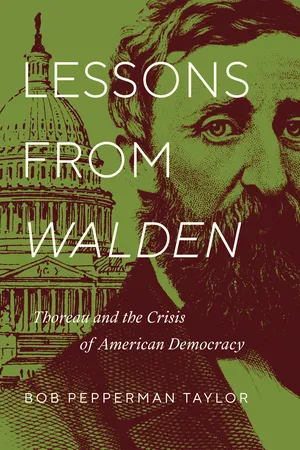![]()
NOTES
Introduction
1. Henry David Thoreau, Walden, in A Week on the Concord and Merrimack Rivers; Walden, or, Life in the Woods; The Maine Woods; Cape Cod (New York: Library of America, 1985), 389.
2. Ibid., 586.
3. Ibid., 581.
4. Ibid., 547, 570.
5. Ibid., 551.
6. Ibid., 394.
7. Ibid., 587.
8. Ibid., 329.
9. Ibid., 328. This is an unfortunate trope found in a number of Thoreau’s writings. It added rhetorical punch to his social critique, but at the significant cost of trivializing—or at least not taking as seriously as he should—the brutality and criminality of American slavery.
10. Ibid., 325.
11. Ibid., 326.
12. And, in honesty, he gives us reason to worry about this from time to time during flights of particularly exaggerated rhetoric. Consider, for just one example, his comment in the opening pages of Walden that, “I have lived some thirty years on this planet, and I have yet to hear the first syllable of valuable or even earnest advice from my seniors. They have told me nothing, and probably cannot tell me any thing, to the purpose” (ibid., 330).
13. Ibid., 335.
14. In a famous and cryptic passage, Thoreau writes, “I long ago lost a hound, a bay horse, and turtledove, and am still on their trail” (ibid., 336). We know from his biography that his losses included his brother, who died young from a tetanus infection, a young woman who refused his marriage proposal, and even his first profession as a school teacher; for comments about this last matter, see ibid., 377.
15. Ibid., 384.
16. Ibid., 361.
17. Ibid., 331.
18. Ibid., 338.
19. Ibid., 579.
20. Ibid., 580.
21. Ibid., 586.
22. Brian Walker, “Thoreau’s Alternative Economics: Work, Liberty, and Democratic Cultivation,” American Political Science Review 92, no. 4 (1998): 845–56.
23. Walden, 389.
24. Ibid., 350.
25. Ibid., 409–10. Here, and throughout the text, for quoted material, if I have not noted otherwise (by saying “my emphasis”), the italics are in the original text. This is true throughout the book.
26. Ibid., 443.
27. Henry David Thoreau, Civil Disobedience, ed. Bob Pepperman Taylor (Peterborough, ON: Broadview Press, 2016), 42.
28. Jane Bennett, “On Being a Native: Thoreau’s Hermeneutics of Self,” Polity 22, no. 4 (1990): 559.
29. Plato, The Republic, trans. G. M. A. Grube, rev. C. D. C. Reeve (Indianapolis: Hackett, 1992), bk. 7, 227–28.
30. Ibid., 232.
31. Ibid., 231.
32. Ibid., 234.
33. Ibid., 232.
34. Mann’s son accompanied Thoreau on his final journey, west to Minnesota, where Thoreau was seeking a cure for the tuberculosis that would soon kill him.
35. Horace Mann, Lectures on Education (Boston: Lemuel N. Ide, 1850), 171.
36. See John Locke, Second Treatise on Government (Indianapolis: Hackett, 1980), chap. 2, sec. 6.
37. Ralph Waldo Emerson, “Napoleon; or, the Man of the World,” chapter 6 of Representative Men, in Essays and Lectures (New York: Library of America, 1983), 727.
38. Ibid., 742.
39. Ibid., 743.
40. Ibid., 745.
41. Andrew Delbanco, The Death of Satan (New York: Farrar, Straus and Giroux, 1995), 105–6. A similar point is made by Andrew Shankman, Crucible of American Democracy (Lawrence: University Press of Kansas, 2004), 230–33.
42. Gordon Wood, Empire of Liberty (New York: Oxford University Press, 2009), 736.
43. Lance Banning, Jefferson and Madison (Madison, WI: Madison House, 1995), 90.
44. James Fenimore Cooper, The American Democrat (New York: Penguin, 1989), 141.
45. Bryan Caplan, The Myth of the Rational Voter (Princeton, NJ: Princeton University Press, 2007), 19.
46. The original poem had also requested that “God shed His grace on thee / Till selfish gain no longer stain, / The banner of the free!” Thanks to Francis Gregory Gause for this observation.
47. Under the stress of the Cold War, the Pledge of Allegiance was amended to include reference to God in order to further differentiate American values from communism and the Soviet Union. See discussion in Danielle Allen, Talking to Strangers (Chicago: University of Chicago Press, 2004), 13. For a fascinating book-length study of the Pledge, see Richard Ellis, To the Flag (Lawrence: University Press of Kansas, 2005).
48. Theodore Roosevelt declares, for example, that “people who say they have not time to attend to politics are simply saying that they are unfit to live in a free community”; Roosevelt, The Works of Theodore Roosevelt (New York: Charles Scribner’s Sons, 1926), 13:282. Florence Kelly, in 1899, charged: “Under the guise of republican freedom, we have degenerated into a nation of mock citizens”; quoted in Eric Foner, The Story of American Freedom (New York: W. W. Norton, 1998), 124. Foner discusses the growth of the “cult of the flag” and the emergence of “The Star-Spangled Banner” in the 1890s (see 134).
49. William James, Writings 1902–1910 (New York: Library of America, 1987), 1289.
50. Mark Twain, The Autobiography of Mark Twain (Berkeley: University of California Press, 2010), 1:259–60.
51. For a significantly less amused reflection on American impulsiveness and irresponsibility, see John Updike, Rabbit Run (New York: Random House, 1960).
52. Herb London, “If We Don’t Shape Up, Who’ll Ship Out?,” Burlington [VT] Free Press, April 6, 2002, 6A.
53. Stephen Carter, Integrity (New York: Basic Books, 1996), 221.
54. Stephen Carter, Civility (New York: Basic Books, 1998), 17.
55. Robert Dahl, On Political Equality (New Haven, CT: Yale University Press, 2006). See, for examp...
